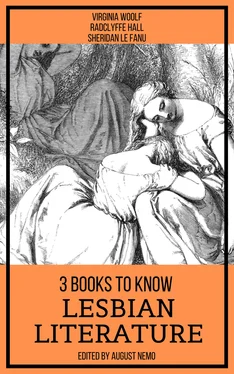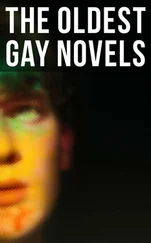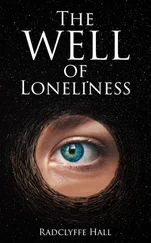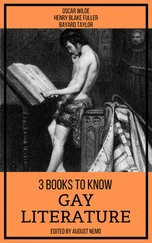Orlando slept all night in ignorance. He had been kissed by a queen without knowing it. And perhaps, for women's hearts are intricate, it was his ignorance and the start he gave when her lips touched him that kept the memory of her young cousin (for they had blood in common) green in her mind. At any rate, two years of this quiet country life had not passed, and Orlando had written no more perhaps than twenty tragedies and a dozen histories and a score of sonnets when a message came that he was to attend the Queen at Whitehall.
'Here', she said, watching him advance down the long gallery towards her, 'comes my innocent!' (There was a serenity about him always which had the look of innocence when, technically, the word was no longer applicable.)
'Come!' she said. She was sitting bolt upright beside the fire. And she held him a foot's pace from her and looked him up and down. Was she matching her speculations the other night with the truth now visible? Did she find her guesses justified? Eyes, mouth, nose, breast, hips, hands—she ran them over; her lips twitched visibly as she looked; but when she saw his legs she laughed out loud. He was the very image of a noble gentleman. But inwardly? She flashed her yellow hawk's eyes upon him as if she would pierce his soul. The young man withstood her gaze blushing only a damask rose as became him. Strength, grace, romance, folly, poetry, youth—she read him like a page. Instantly she plucked a ring from her finger (the joint was swollen rather) and as she fitted it to his, named him her Treasurer and Steward; next hung about him chains of office; and bidding him bend his knee, tied round it at the slenderest part the jewelled order of the Garter. Nothing after that was denied him. When she drove in state he rode at her carriage door. She sent him to Scotland on a sad embassy to the unhappy Queen. He was about to sail for the Polish wars when she recalled him. For how could she bear to think of that tender flesh torn and that curly head rolled in the dust? She kept him with her. At the height of her triumph when the guns were booming at the Tower and the air was thick enough with gunpowder to make one sneeze and the huzzas of the people rang beneath the windows, she pulled him down among the cushions where her women had laid her (she was so worn and old) and made him bury his face in that astonishing composition—she had not changed her dress for a month—which smelt for all the world, he thought, recalling his boyish memory, like some old cabinet at home where his mother's furs were stored. He rose, half suffocated from the embrace. 'This', she breathed, 'is my victory!'—even as a rocket roared up and dyed her cheeks scarlet.
For the old woman loved him. And the Queen, who knew a man when she saw one, though not, it is said, in the usual way, plotted for him a splendid ambitious career. Lands were given him, houses assigned him. He was to be the son of her old age; the limb of her infirmity; the oak tree on which she leant her degradation. She croaked out these promises and strange domineering tendernesses (they were at Richmond now) sitting bolt upright in her stiff brocades by the fire which, however high they piled it, never kept her warm.
Meanwhile, the long winter months drew on. Every tree in the Park was lined with frost. The river ran sluggishly. One day when the snow was on the ground and the dark panelled rooms were full of shadows and the stags were barking in the Park, she saw in the mirror, which she kept for fear of spies always by her, through the door, which she kept for fear of murderers always open, a boy—could it be Orlando?—kissing a girl—who in the Devil's name was the brazen hussy? Snatching at her golden-hilted sword she struck violently at the mirror. The glass crashed; people came running; she was lifted and set in her chair again; but she was stricken after that and groaned much, as her days wore to an end, of man's treachery.
It was Orlando's fault perhaps; yet, after all, are we to blame Orlando? The age was the Elizabethan; their morals were not ours; nor their poets; nor their climate; nor their vegetables even. Everything was different. The weather itself, the heat and cold of summer and winter, was, we may believe, of another temper altogether. The brilliant amorous day was divided as sheerly from the night as land from water. Sunsets were redder and more intense; dawns were whiter and more auroral. Of our crepuscular half-lights and lingering twilights they knew nothing. The rain fell vehemently, or not at all. The sun blazed or there was darkness. Translating this to the spiritual regions as their wont is, the poets sang beautifully how roses fade and petals fall. The moment is brief they sang; the moment is over; one long night is then to be slept by all. As for using the artifices of the greenhouse or conservatory to prolong or preserve these fresh pinks and roses, that was not their way. The withered intricacies and ambiguities of our more gradual and doubtful age were unknown to them. Violence was all. The flower bloomed and faded. The sun rose and sank. The lover loved and went. And what the poets said in rhyme, the young translated into practice. Girls were roses, and their seasons were short as the flowers'. Plucked they must be before nightfall; for the day was brief and the day was all. Thus, if Orlando followed the leading of the climate, of the poets, of the age itself, and plucked his flower in the window-seat even with the snow on the ground and the Queen vigilant in the corridor we can scarcely bring ourselves to blame him. He was young; he was boyish; he did but as nature bade him do. As for the girl, we know no more than Queen Elizabeth herself did what her name was. It may have been Doris, Chloris, Delia, or Diana, for he made rhymes to them all in turn; equally, she may have been a court lady, or some serving maid. For Orlando's taste was broad; he was no lover of garden flowers only; the wild and the weeds even had always a fascination for him.
Here, indeed, we lay bare rudely, as a biographer may, a curious trait in him, to be accounted for, perhaps, by the fact that a certain grandmother of his had worn a smock and carried milkpails. Some grains of the Kentish or Sussex earth were mixed with the thin, fine fluid which came to him from Normandy. He held that the mixture of brown earth and blue blood was a good one. Certain it is that he had always a liking for low company, especially for that of lettered people whose wits so often keep them under, as if there were the sympathy of blood between them. At this season of his life, when his head brimmed with rhymes and he never went to bed without striking off some conceit, the cheek of an innkeeper's daughter seemed fresher and the wit of a gamekeeper's niece seemed quicker than those of the ladies at Court. Hence, he began going frequently to Wapping Old Stairs and the beer gardens at night, wrapped in a grey cloak to hide the star at his neck and the garter at his knee. There, with a mug before him, among the sanded alleys and bowling greens and all the simple architecture of such places, he listened to sailors' stories of hardship and horror and cruelty on the Spanish main; how some had lost their toes, others their noses—for the spoken story was never so rounded or so finely coloured as the written. Especially he loved to hear them volley forth their songs of 'the Azores, while the parrakeets, which they had brought from those parts, pecked at the rings in their ears, tapped with their hard acquisitive beaks at the rubies on their fingers, and swore as vilely as their masters. The women were scarcely less bold in their speech and less free in their manner than the birds. They perched on his knee, flung their arms round his neck and, guessing that something out of the common lay hid beneath his duffle cloak, were quite as eager to come at the truth of the matter as Orlando himself.
Читать дальше












